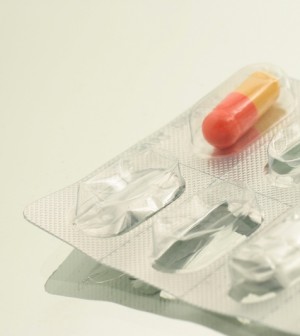- Double Mastectomy May Offer No Survival Benefit to Women With Breast Cancer
- Toxic Lead Found in Cinnamon Product, FDA Says
- Certain Abbott Blood Sugar Monitors May Give Incorrect Readings
- Athletes Can Expect High Ozone, Pollen Counts for Paris Olympics
- Fake Oxycontin Pills Widespread and Potentially Deadly: Report
- Shingles Vaccine Could Lower Dementia Risk
- Your Odds for Accidental Gun Death Rise Greatly in Certain States
- Kids From Poorer Families Less Likely to Survive Cancer
- Tough Workouts Won’t Trigger Cardiac Arrest in Folks With Long QT Syndrome
- At-Home Colon Cancer Test Can Save Lives
Study: Daily Low-Dose Aspirin May Help Ward Off Pancreatic Cancer


People who take low-dose aspirin for more than 10 years might be reducing their risk for pancreatic cancer, a new study suggests.
Even taking a daily aspirin for just three years lowered the chances of the deadly cancer by 48 percent, the researchers said.
“Aspirin use has potential risks of its own, thus the risks and benefits for each person have to be evaluated based on personal characteristics,” said lead researcher Dr. Harvey Risch, a professor of epidemiology at the Yale School of Public Health.
“For the small numbers of people with strong family histories of pancreatic cancer or who otherwise have been evaluated to be at increased risk of pancreatic cancer, aspirin use could be part of a regimen designed to reduce their risk,” he said.
The main risk with continued aspirin use is bleeding in the stomach.
The report was published online June 26 in Cancer Epidemiology, Biomarkers & Prevention.
Eric Jacobs, strategic director for pharmacoepidemiology at the American Cancer Society, said taking aspirin hasn’t been proven to reduce the risk of pancreatic cancer. And no one should take aspirin in the hope of lowering their risk for any cancer.
“The link between aspirin use, particularly low-dose aspirin use, and lower risk of pancreatic cancer observed in this study is intriguing,” but not proven, he said.
Results of other studies of aspirin and pancreatic cancer have been mixed, Jacobs said.
“While long-term regular aspirin use lowers the risk of colorectal cancer, evidence is much too limited to draw conclusions about aspirin and pancreatic cancer. We do know, however, that the most important ways to lower risk of ever getting pancreatic cancer are to avoid smoking and maintain a healthy weight,” he said.
“The American Cancer Society, therefore, does not recommend taking aspirin specifically to prevent cancer. People thinking about taking aspirin on a regular basis should talk to their health care provider, who can take their individual medical history into account when weighing the overall benefits and risks of using aspirin,” Jacobs added.
For the study, Risch and colleagues collected data on 362 people with pancreatic cancer and 690 who did not have the disease. Participants were recruited from 30 Connecticut hospitals between 2005 and 2009.
All of the study participants were asked when they began taking aspirin, how much and for how long. The researchers also took into account other factors, such as weight, smoking history and any history of diabetes.
A dose of 75 milligrams to 325 milligrams of aspirin per day was considered low-dose and was usually taken to prevent heart disease. The researchers considered a dose higher than that, usually taken every four to six hours, as regular-dose taken for pain.
The investigators found that the earlier someone started taking low-dose aspirin regularly, the more the risk for pancreatic cancer seemed reduced.
The reduction ranged from 48 percent among those who started three years before the study to 60 percent in those who started taking it 20 years before the study, the researchers said.
However, people who stopped taking aspirin within two years before the study saw their risk for pancreatic cancer increase threefold, compared with those who continued taking aspirin, the authors said.
Dr. Tony Philip, an oncologist at North Shore-LIJ Cancer Institute in Lake Success, N.Y., said, “Pancreatic cancer is not a common cancer, but a deadly one nonetheless.”
Over the last several years, more has been learned about the role of inflammation in cancer, he said, and has been well described in colon cancer. There are also ongoing studies looking at the role of anti-inflammatory drugs in reducing recurrence of other types of tumors.
“Much more work needs to be done before we start recommending this [aspirin] to the general population. The next step, which may be harder to do, is to prove cause and effect and figure out who benefits most from this,” Philip said.
More information
For more about pancreatic cancer, visit the American Cancer Society.
Source: HealthDay
Copyright © 2024 HealthDay. All rights reserved.










